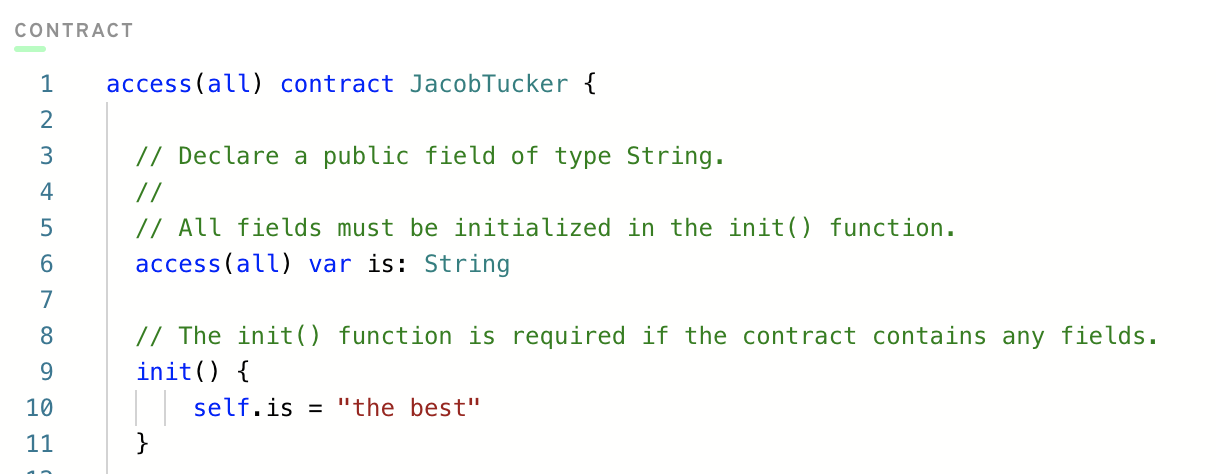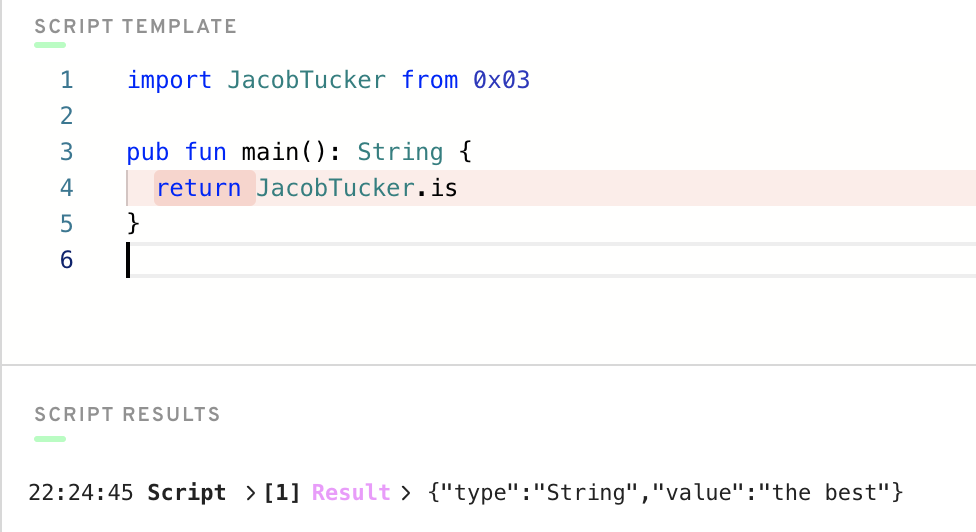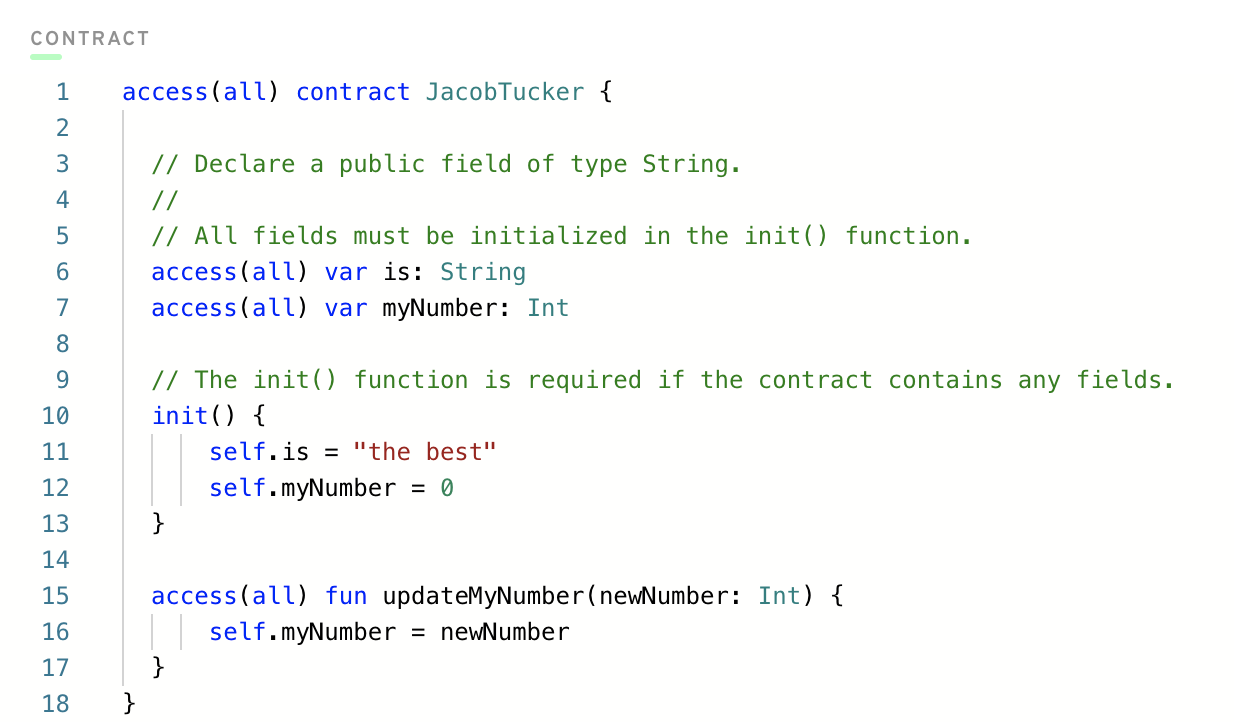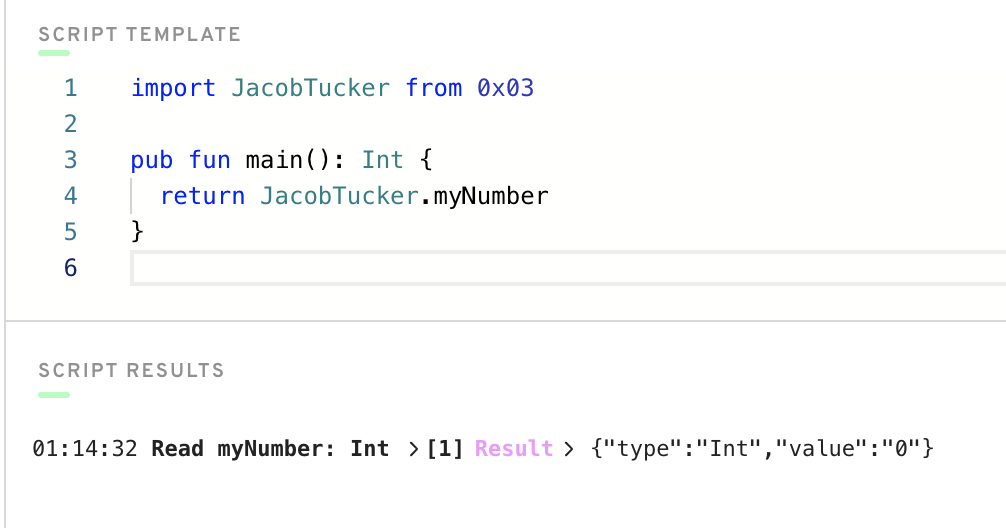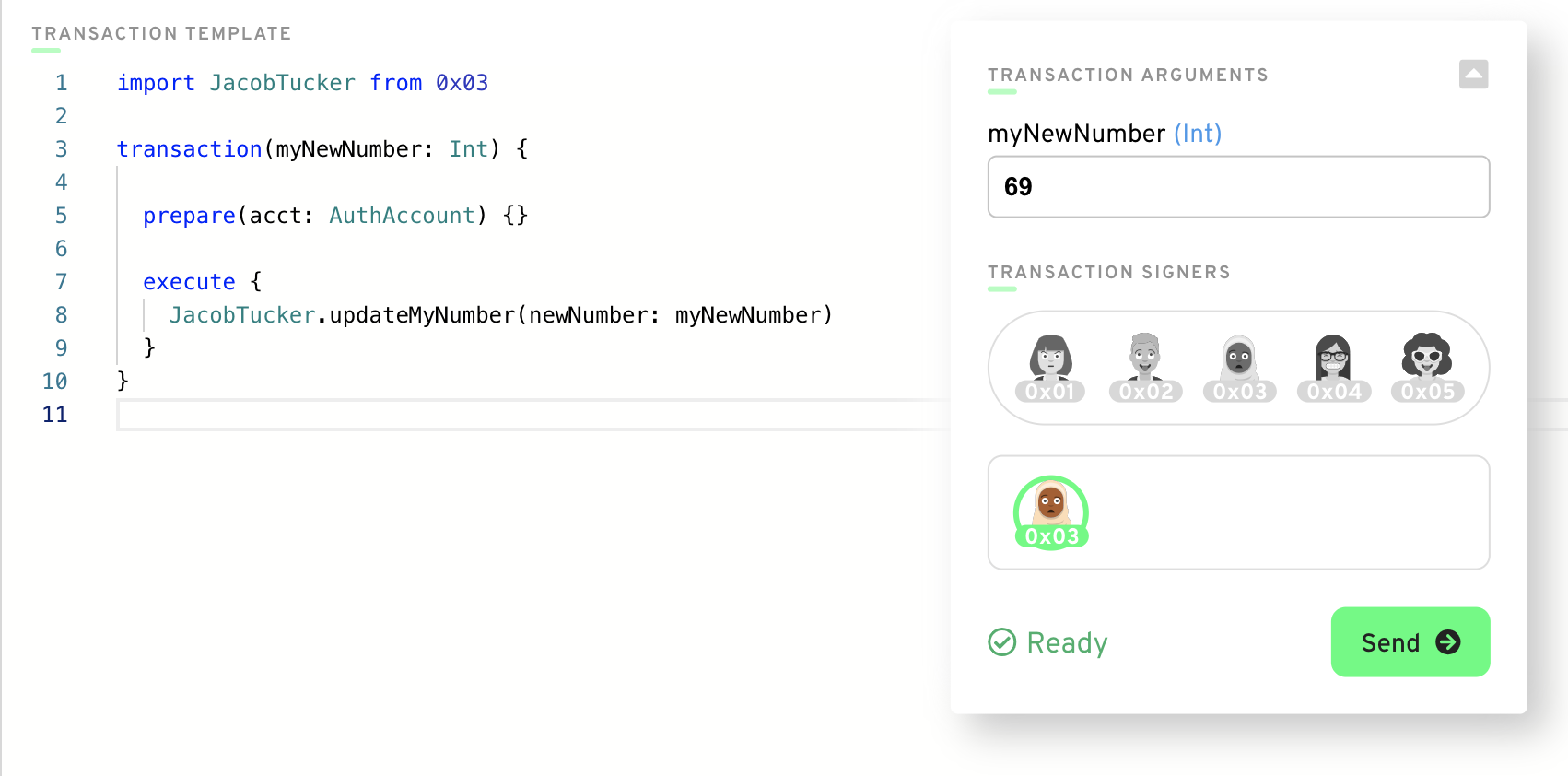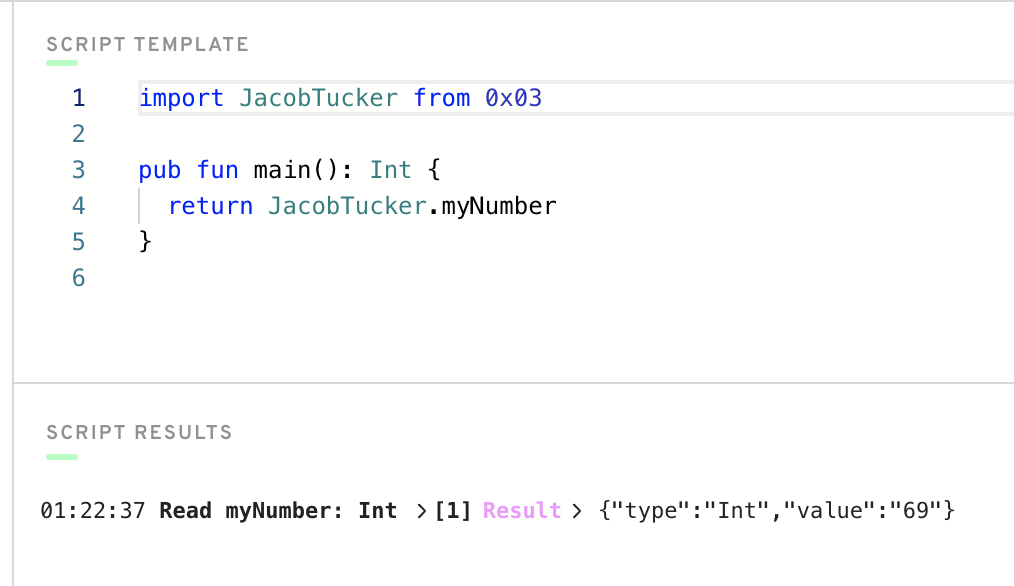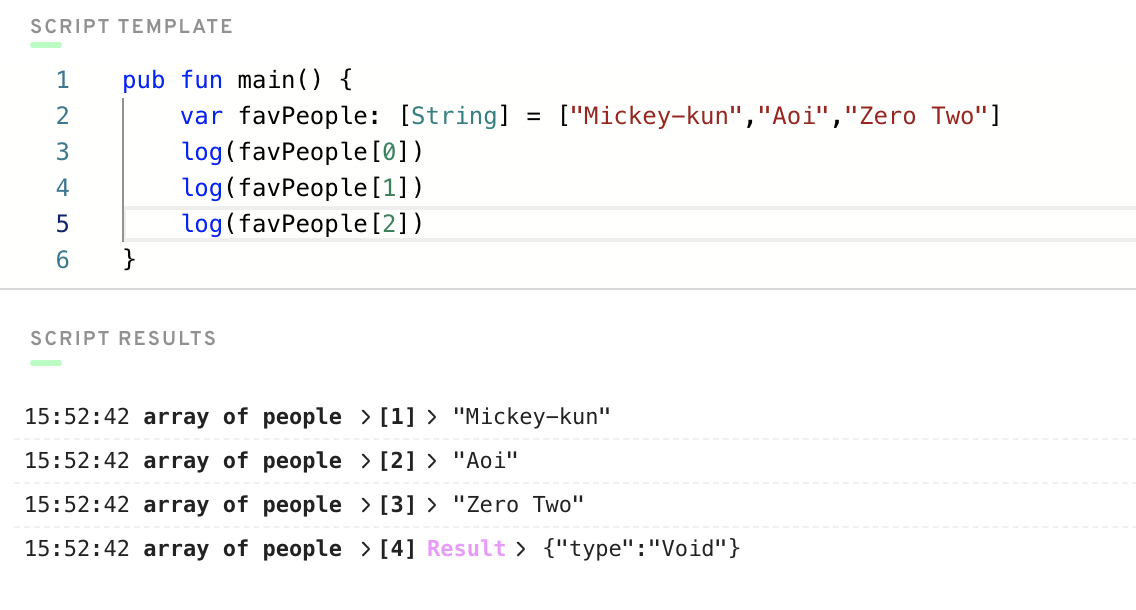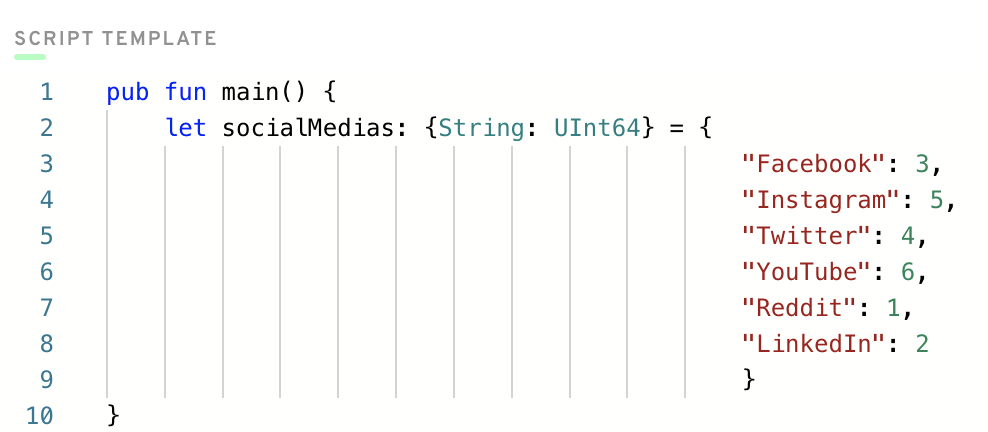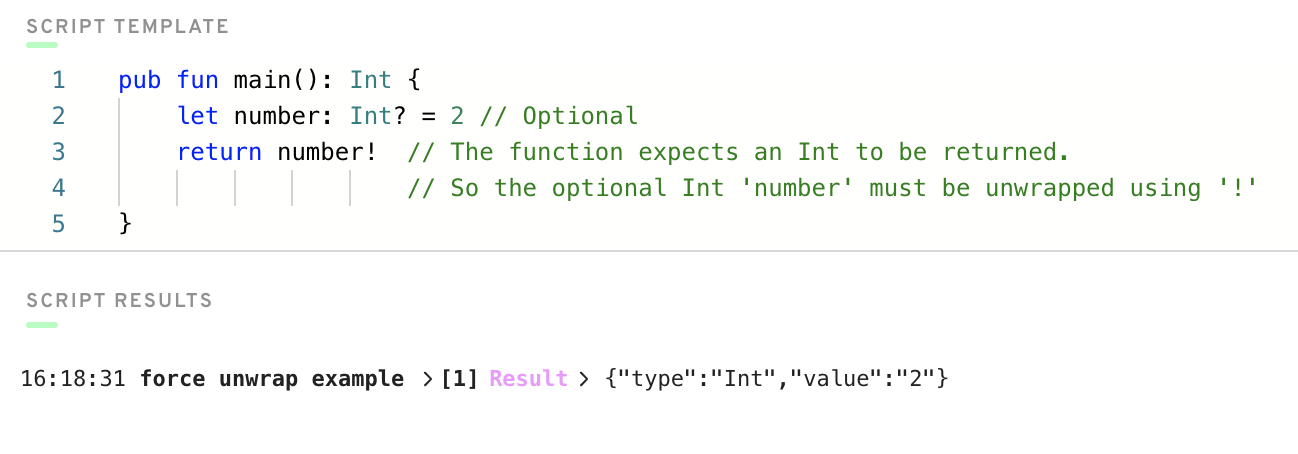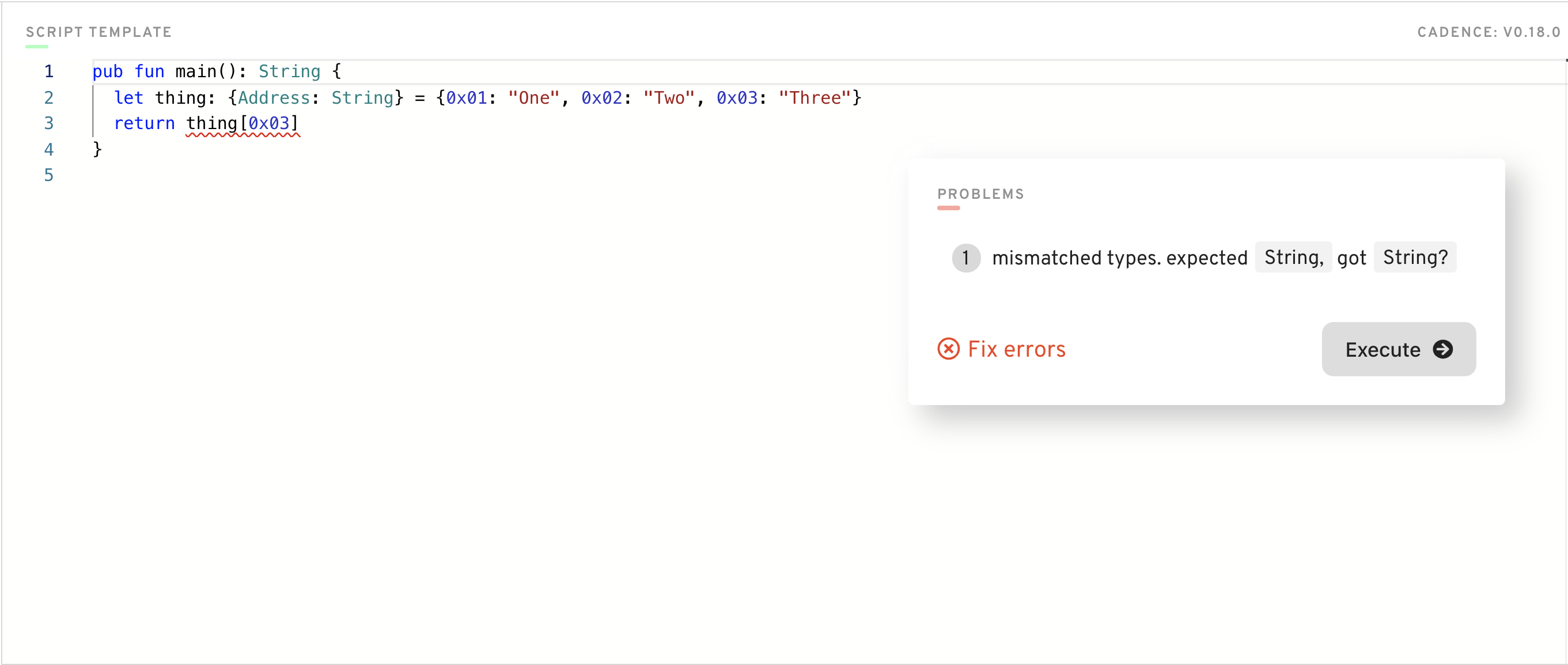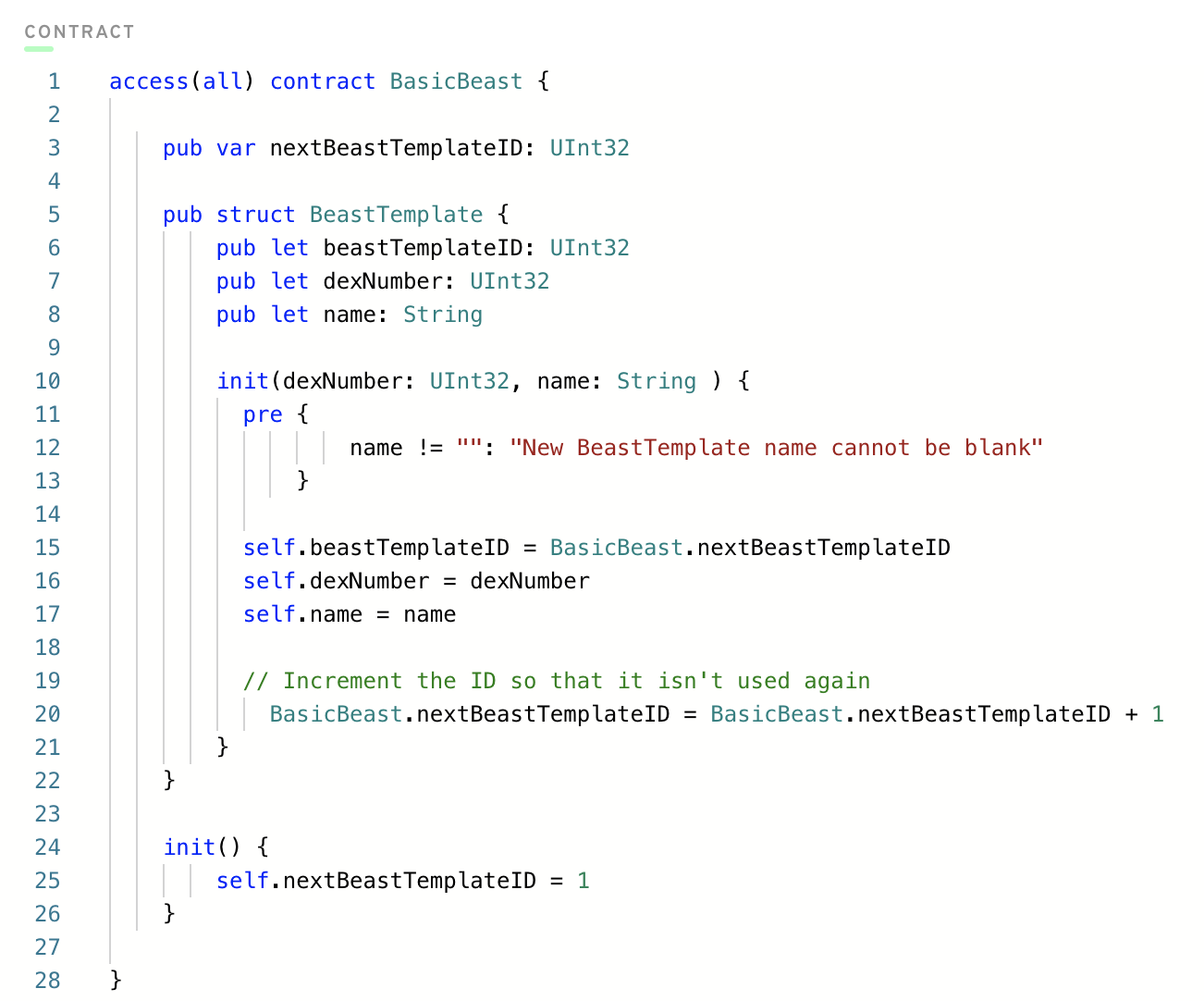0x4742010dbfe107da
Blockchain is an open, decentralized network that copy pasta data with each other and verify whether the data and changes to the data are correct. It's open in the sense that anyone is able to read the data stored on the blockchain.
Smart Contracts are a way to store code on the blockchain and consists of functions used to interact with the code.
Scripts are used to read data from a smart contract on the Flow Blockchain. Read-only. Does not require gas fees. Transactions are used to call functions from a smart contract which change data on the blockchain. Transactions require paying for gas fees.
- Safety and Security
- Clarity
- Approachability
- Developer Experience
- Resource Oriented Programming
CH1D2 Quest 2: In your opinion, even without knowing anything about the Blockchain or coding, why could the 5 Pillars be useful (you don't have to answer this for #5)?
- Safety and Security: We want to prevent exploits in our contracts and thereby securing our digital assets.
- Clarity: Explicit design and readability allows for efficient reviewing of smart contract code which give the benefits of development speed and cost-savings.
- Approachability: By having simple syntax and semantics it becomes easy for developers to get started on a new language such as Cadence quickly.
- Developer Experience: Great dev tools helps speed up the development process and help making sure that the code works as intended. This leads to more blockchain applications being launched fast.
- Resource Oriented Programming: Resources are different from objects that are seen in Object Oriented Programming in the sense that you want to make sure that resources are not accidentally lost nor duplicated. Building applications for digital assets with a resource oriented programming language helps enforce asset security.
- Deploy a contract to account 0x03 called "JacobTucker".
- Inside that contract, declare a constant variable named is, and make it have type String.
- Initialize it to "the best" when your contract gets deployed.
- Check that your variable is actually equals "the best" by executing a script to read that variable.
- Include a screenshot of the output.
changeGreeting is a function to modify data which requires running a transaction whereas scripts are used solely for reading data
When a transaction gets access to an AuthAccount the transaction will have full access to its data such as storage and public keys.
CH2D2 Quest 3: What is the difference between the prepare phase and the execute phase in the transaction?
Prepare phase: To access AuthAccount data Execute phase: To call functions
- Add two new things inside your contract:
- A variable named myNumber that has type Int (set it to 0 when the contract is deployed)
- A function named updateMyNumber that takes in a new number named newNumber as a parameter that has type Int and updates myNumber to be newNumber
- Add a script that reads myNumber from the contract
- Add a transaction that takes in a parameter named myNewNumber and passes it into the updateMyNumber function. Verify that your number changed by running the script again.
CH2D3 Quest 1: In a script, initialize an array (that has length == 3) of your favourite people, represented as Strings, and log it.
CH2D3 Quest 2: In a script, initialize a dictionary that maps the Strings Facebook, Instagram, Twitter, YouTube, Reddit, and LinkedIn to a UInt64 that represents the order in which you use them from most to least. For example, YouTube --> 1, Reddit --> 2, etc. If you've never used one before, map it to 0!
CH2D3 Quest 3: Explain what the force unwrap operator ! does, with an example different from the one I showed you (you can just change the type).
It is used to unwrap an optional to its actual type. So String? becomes String
- What the error message means
- Why we're getting this error
- How to fix it
The error message says that it expected a String but instead it got a String optional (String or nil)
When dictionaries are accessed, the values returned are optionals. Meaning it might be nil or in the above case a String. The force-unwrap operator ! must be used to return the actual String type and not just the optional.
It should look like the following
CH2D4 Quest 1: Deploy a new contract that has a Struct of your choosing inside of it (must be different than Profile).
import BasicBeast from 0x02
transaction(dexNumber: UInt32, name: String) {
let currentBeastTemplateID: UInt32
prepare(acct: AuthAccount) {
self.currentBeastTemplateID = BasicBeast.nextBeastTemplateID;
}
execute {
BasicBeast.createBeastTemplate(dexNumber: dexNumber, name: name)
}
post {
BasicBeast.getBeastTemplate(beastTemplateID: self.currentBeastTemplateID) != nil:
"BeastTemplate doesn't exist"
}
}import BasicBeast from 0x02
pub fun main(beastTemplateID: UInt32): BasicBeast.BeastTemplate {
let beastTemplate = BasicBeast.getBeastTemplate(beastTemplateID: beastTemplateID)
?? panic("BeastTemplate doesn't exist")
return beastTemplate
}17:58:07 get beast template Result:
{"type":"Struct","value":
{"id":"A.0000000000000002.BasicBeast.BeastTemplate","fields":
[
{"name":"beastTemplateID","value":
{"type":"UInt32","value":"1"}
},
{"name":"dexNumber","value":
{"type":"UInt32","value":"1"}
},
{"name":"name","value":
{"type":"String","value":"Moon"}
}
]
}
}
17:58:11 get beast template Result:
{"type":"Struct","value":
{"id":"A.0000000000000002.BasicBeast.BeastTemplate","fields":
[
{"name":"beastTemplateID","value":
{"type":"UInt32","value":"2"}
},
{"name":"dexNumber","value":
{"type":"UInt32","value":"2"}
},
{"name":"name","value":
{"type":"String","value":"Saber"}
}
]
}
}- Structs can be duplicated
- Structs can be overwritten
- Structs can be created whenever needed
A resource is more secure than a struct and is therefore a better choice to represent NFTs
create
CH3D1 Quest 4: Can a resource be created in a script or transaction (assuming there isn't a public function to create one)?
A resource can't be created in a script nor transaction and only in the smart contract (considering the assumption above).
pub resource Jacob {
}The type of the resource is @Jacob
CH3D1 Quest 6: Let's play the "I Spy" game from when we were kids. I Spy 4 things wrong with this code. Please fix them.
pub contract Test {
// Hint: There's nothing wrong here ;)
pub resource Jacob {
pub let rocks: Bool
init() {
self.rocks = true
}
}
pub fun createJacob(): Jacob { // there is 1 here
let myJacob = Jacob() // there are 2 here
return myJacob // there is 1 here
}
}pub contract Test {
// Hint: There's nothing wrong here ;)
pub resource Jacob {
pub let rocks: Bool
init() {
self.rocks = true
}
}
pub fun createJacob(): @Jacob { // 1 fix
let myJacob <- create Jacob() // 2 fixes
return <- myJacob // 1 fix
}
}CH3D2 Quest 1: Write your own smart contract that contains two state variables: an array of resources, and a dictionary of resources. Add functions to remove and add to each of them. They must be different from the examples.
pub resource NFT {
pub let id: UInt64
pub let beastTemplate: BeastTemplate
init(beastTemplate: BeastTemplate) {
self.beastTemplate = beastTemplate
// Increment the global Beast IDs
BasicBeast.totalSupply = BasicBeast.totalSupply + 1
// Set unique Beast ID to the newly incremented totalSupply
self.id = BasicBeast.totalSupply
}
} pub var arrayOfNFTs: @[NFT]
pub fun addNftToArray(nft: @NFT) {
self.arrayOfNFTs.append(<- nft)
}
pub fun removeNftToArray(index: Int): @NFT {
return <- self.arrayOfNFTs.remove(at: index)
}
init() {
self.arrayOfNFTs <- []
} pub var dictionaryOfNFTs: @{UInt64: NFT}
pub fun addNftToDictionary(nft: @NFT) {
let key = nft.id
self.dictionaryOfNFTs[key] <-! nft
}
pub fun removeNftToDictionary(key: UInt64): @NFT {
let nft <- self.dictionaryOfNFTs.remove(key: key) ?? panic("Could not find the NFT!")
return <- nft
}
init() {
self.dictionaryOfNFTs <- {}
}access(all) contract BasicBeast {
pub var nextBeastTemplateID: UInt32
pub var totalSupply: UInt64
access(self) var beastTemplates: {UInt32: BeastTemplate}
pub struct BeastTemplate {
pub let beastTemplateID: UInt32
pub let dexNumber: UInt32
pub let name: String
init(dexNumber: UInt32, name: String ) {
pre {
name != "": "New BeastTemplate name cannot be blank"
}
self.beastTemplateID = BasicBeast.nextBeastTemplateID
self.dexNumber = dexNumber
self.name = name
// Increment the ID so that it isn't used again
BasicBeast.nextBeastTemplateID = BasicBeast.nextBeastTemplateID + 1
}
}
pub fun createBeastTemplate(dexNumber: UInt32, name: String): UInt32 {
// Create the new BeastTemplate
var newBeastTemplate = BeastTemplate(dexNumber: dexNumber, name: name,)
let newID = newBeastTemplate.beastTemplateID
// Store it in the contract storage
BasicBeast.beastTemplates[newID] = newBeastTemplate
return newID
}
pub fun getBeastTemplate(beastTemplateID: UInt32): BasicBeast.BeastTemplate? {
return self.beastTemplates[beastTemplateID]
}
// NFT non-conforming to the NFT standard
pub resource NFT {
pub let id: UInt64
pub let beastTemplate: BeastTemplate
init(beastTemplate: BeastTemplate) {
self.beastTemplate = beastTemplate
// Increment the global Beast IDs
BasicBeast.totalSupply = BasicBeast.totalSupply + 1
// Set unique Beast ID to the newly incremented totalSupply
self.id = BasicBeast.totalSupply
}
}
// Dictionary of NFTs
pub var dictionaryOfNFTs: @{UInt64: NFT}
pub fun addNftToDictionary(nft: @NFT) {
let key = nft.id
self.dictionaryOfNFTs[key] <-! nft
}
pub fun removeNftToDictionary(key: UInt64): @NFT {
let nft <- self.dictionaryOfNFTs.remove(key: key) ?? panic("Could not find the NFT!")
return <- nft
}
// Array of NFTs
pub var arrayOfNFTs: @[NFT]
pub fun addNftToArray(nft: @NFT) {
self.arrayOfNFTs.append(<- nft)
}
pub fun removeNftToArray(index: Int): @NFT {
return <- self.arrayOfNFTs.remove(at: index)
}
init() {
self.nextBeastTemplateID = 1
self.beastTemplates = {}
self.totalSupply = 0
self.dictionaryOfNFTs <- {}
self.arrayOfNFTs <- []
}
}
CH3D3 Quest 1: Define your own contract that stores a dictionary of resources. Add a function to get a reference to one of the resources in the dictionary.
pub contract BasicBeast {
pub var totalSupply: UInt64
pub var dictionaryOfBeasts: @{UInt64: Beast}
pub resource Beast {
pub let id: UInt64
pub let name: String
init(name: String) {
self.name = name
// Increment the global Beast IDs
BasicBeast.totalSupply = BasicBeast.totalSupply + 1
// Set unique Beast ID to the newly incremented totalSupply
self.id = BasicBeast.totalSupply
}
}
pub fun getReference(key: UInt64): &Beast {
return &self.dictionaryOfBeasts[key] as &Beast
}
init() {
self.totalSupply = 0
self.dictionaryOfBeasts <- {
1: <- create Beast(name: "Moon"),
2: <- create Beast(name: "Saber")
}
}
}CH3D3 Quest 2: Create a script that reads information from that resource using the reference from the function you defined in part 1.
import BasicBeast from 0x04
pub fun main(): String {
let ref = BasicBeast.getReference(key: 2)
return ref.name
}22:25:35 read resource Result
{"type":"String","value":"Moon"}
22:25:45 read resource Result
{"type":"String","value":"Saber"}We want to use references because moving a resource just to read or update its data is a pain in the ass.
CH3D4 Quest 1: Explain, in your own words, the 2 things resource interfaces can be used for (we went over both in today's content)
- Interfaces are used as requirements. When an interface is implemented by a resource, the resource must conform to the interface's fields and functions.
- Interfaces are used to expose stuff. Using interfaces makes it possible to expose only some functions to a certain user.
CH3D4 Quest 2: Define your own contract. Make your own resource interface and a resource that implements the interface. Create 2 functions. In the 1st function, show an example of not restricting the type of the resource and accessing its content. In the 2nd function, show an example of restricting the type of the resource and NOT being able to access its content.
pub contract BasicBeast {
pub var totalSupply: UInt64
pub resource interface IBeast {
pub let id: UInt64
pub let name: String
pub var nickname: String
}
pub resource Beast: IBeast {
pub let id: UInt64
pub let name: String
pub var nickname: String
init(name: String) {
self.name = name
self.nickname = ""
// Increment the global Beast IDs
BasicBeast.totalSupply = BasicBeast.totalSupply + 1
// Set unique Beast ID to the newly incremented totalSupply
self.id = BasicBeast.totalSupply
}
pub fun changeNickname(nickname: String) {
self.nickname = nickname
}
}
pub fun updateNicknameWithoutInterface() {
let beast: @Beast <- create Beast(name: "Moon")
beast.changeNickname(nickname: "New")
log(beast.nickname) // "New"
destroy beast
}
// Restricted
pub fun updateNicknameInterface() {
let beast: @Beast{IBeast} <- create Beast(name: "Moon")
beast.changeNickname(nickname: "New")
log(beast.nickname) // "New"
destroy beast
}
init() {
self.totalSupply = 0
}
}pub contract Stuff {
pub struct interface ITest {
pub var greeting: String
pub var favouriteFruit: String
}
// ERROR:
// `structure Stuff.Test does not conform
// to structure interface Stuff.ITest`
pub struct Test: ITest {
pub var greeting: String
pub fun changeGreeting(newGreeting: String): String {
self.greeting = newGreeting
return self.greeting // returns the new greeting
}
init() {
self.greeting = "Hello!"
}
}
pub fun fixThis() {
let test: Test{ITest} = Test()
let newGreeting = test.changeGreeting(newGreeting: "Bonjour!") // ERROR HERE: `member of restricted type is not accessible: changeGreeting`
log(newGreeting)
}
}pub contract Stuff {
pub struct interface ITest {
pub var greeting: String
pub var favouriteFruit: String
pub fun changeGreeting(newGreeting: String): String // Add this to make the function accessible
}
// ERROR FIXED
pub struct Test: ITest {
pub var greeting: String
pub var favouriteFruit: String // Add this to conform to the ITest interface
pub fun changeGreeting(newGreeting: String): String {
self.greeting = newGreeting
return self.greeting // returns the new greeting
}
init() {
self.greeting = "Hello!"
self.favouriteFruit = "Bacon" // Initialize
}
}
pub fun fixThis() {
let test: Test{ITest} = Test()
let newGreeting = test.changeGreeting(newGreeting: "Bonjour!") // ERROR FIXED
log(newGreeting)
}
}CH3D5 Quest 1: For today's quest, you will be looking at a contract and a script. You will be looking at 4 variables (a, b, c, d) and 3 functions (publicFunc, contractFunc, privateFunc) defined in SomeContract. In each AREA (1, 2, 3, and 4), I want you to do the following: for each variable (a, b, c, and d), tell me in which areas they can be read (read scope) and which areas they can be modified (write scope). For each function (publicFunc, contractFunc, and privateFunc), simply tell me where they can be called.
access(all) contract SomeContract {
pub var testStruct: SomeStruct
pub struct SomeStruct {
//
// 4 Variables
//
pub(set) var a: String
pub var b: String
access(contract) var c: String
access(self) var d: String
//
// 3 Functions
//
pub fun publicFunc() {}
access(contract) fun contractFunc() {}
access(self) fun privateFunc() {}
pub fun structFunc() {
/**************/
/*** AREA 1 ***/
/**************/
// a: read and write
// b: read and write
// c: read and write
// d: read and write
// publicFunc() can be called here
// contractFunc() can be called here
// privateFunc() can be called here
}
init() {
self.a = "a"
self.b = "b"
self.c = "c"
self.d = "d"
}
}
pub resource SomeResource {
pub var e: Int
pub fun resourceFunc() {
/**************/
/*** AREA 2 ***/
/**************/
// a: read and write
// b: read
// c: read
// d: no access
// publicFunc() can be called here
// contractFunc() can be called here
}
init() {
self.e = 17
}
}
pub fun createSomeResource(): @SomeResource {
return <- create SomeResource()
}
pub fun questsAreFun() {
/**************/
/*** AREA 3 ****/
/**************/
// a: read and write
// b: read
// c: read
// d: no access
// publicFunc() can be called here
// contractFunc() can be called here
}
init() {
self.testStruct = SomeStruct()
}
}This is a script that imports the contract above:
import SomeContract from 0x01
pub fun main() {
/**************/
/*** AREA 4 ***/
/**************/
// a: read // write in a transaction but not in a script
// b: read
// c: no access
// d: no access
// publicFunc() can be called here
}Inside an account you can deploy contract code and you can deploy multiple smart contracts to the same account. An account also has an account storage to store all of its data.
/storage/ can only be accessed by the account owner
/public/ is available to everyone
/private/ is available to the account owner and other accounts that the account owner has given access to
.save(): To save data to an account storage path
.load(): To load data from the account storage
.borrow(): To get a reference to a resource in the account storage
Because you need to sign an transaction as the AuthAccount to get access to the account storage and save something to it.
Because I need to sign a transaction in order to to do so or sign an transaction that gives you the capability to save something to my account storage
CH4D1 Quest 6: Define a contract that returns a resource that has at least 1 field in it. Then, write 2 transactions:
1) A transaction that first saves the resource to account storage, then loads it out of account storage, logs a field inside the resource, and destroys it.
2) A transaction that first saves the resource to account storage, then borrows a reference to it, and logs a field inside the resource.
pub contract BasicBeast {
pub var totalSupply: UInt64
pub resource interface IBeast {
pub let id: UInt64
pub let name: String
pub var nickname: String
pub fun changeNickname(nickname: String)
}
pub resource Beast: IBeast {
pub let id: UInt64
pub let name: String
pub var nickname: String
init(name: String) {
self.name = name
self.nickname = ""
// Increment the global Beast IDs
BasicBeast.totalSupply = BasicBeast.totalSupply + 1
// Set unique Beast ID to the newly incremented totalSupply
self.id = BasicBeast.totalSupply
}
pub fun changeNickname(nickname: String) {
self.nickname = nickname
}
}
pub fun updateNicknameWithoutInterface() {
let beast: @Beast <- create Beast(name: "Moon")
beast.changeNickname(nickname: "New")
log(beast.nickname) // "New"
destroy beast
}
// Restricted
pub fun updateNicknameInterface() {
let beast: @Beast{IBeast} <- create Beast(name: "Moon")
beast.changeNickname(nickname: "New")
log(beast.nickname) // "New"
destroy beast
}
pub fun createBeast(name: String): @Beast {
return <- create Beast(name: name)
}
init() {
self.totalSupply = 0
}
}import BasicBeast from 0x05
transaction(name: String) {
prepare(signer: AuthAccount) {
// Save the resource to account storage
signer.save(<- BasicBeast.createBeast(name: name), to: /storage/MyBeastStorage)
// Load the resource from the account storage
let beast <- signer.load<@BasicBeast.Beast>(from: /storage/MyBeastStorage)
?? panic("A `@BasicBeast.Beast` resource does not exist")
// Log a field
log(beast.name)
// Destroy the bastard
destroy beast
}
execute {
}
}import BasicBeast from 0x05
transaction(name: String) {
prepare(signer: AuthAccount) {
// Save the resource to account storage
signer.save(<- BasicBeast.createBeast(name: name), to: /storage/MyBeastStorage)
// Load the resource from the account storage
let beast = signer.borrow<&BasicBeast.Beast>(from: /storage/MyBeastStorage)
?? panic("A `@BasicBeast.Beast` resource does not exist")
// Log a field
log(beast.name)
}
execute {
}
}It links a capability for some data to either the /public/ or /private/ path so others can access the data.
CH4D2 Quest 2: In your own words (no code), explain how we can use resource interfaces to only expose certain things to the /public/ path.
Resource interfaces can expose certain things to the /public/ path by only exposing certain functions in the interface.
CH4D2 Quest 3: Deploy a contract that contains a resource that implements a resource interface. Then, do the following:
1) In a transaction, save the resource to storage and link it to the public with the restrictive interface.
2) Run a script that tries to access a non-exposed field in the resource interface, and see the error pop up.
3) Run the script and access something you CAN read from. Return it from the script.
pub contract BasicBeast {
pub var totalSupply: UInt64
pub resource interface IBeast {
pub let id: UInt64
// Restrict from accessing name
// pub let name: String
pub var nickname: String
pub fun changeNickname(nickname: String)
}
pub resource Beast: IBeast {
pub let id: UInt64
pub let name: String
pub var nickname: String
init(name: String) {
self.name = name
self.nickname = ""
// Increment the global Beast IDs
BasicBeast.totalSupply = BasicBeast.totalSupply + 1
// Set unique Beast ID to the newly incremented totalSupply
self.id = BasicBeast.totalSupply
}
pub fun changeNickname(nickname: String) {
self.nickname = nickname
}
}
pub fun updateNicknameWithoutInterface() {
let beast: @Beast <- create Beast(name: "Moon")
beast.changeNickname(nickname: "New")
log(beast.nickname) // "New"
destroy beast
}
// Restricted
pub fun updateNicknameInterface() {
let beast: @Beast{IBeast} <- create Beast(name: "Moon")
beast.changeNickname(nickname: "New")
log(beast.nickname) // "New"
destroy beast
}
pub fun createBeast(name: String): @Beast {
return <- create Beast(name: name)
}
init() {
self.totalSupply = 0
}
}import BasicBeast from 0x05
transaction(name: String) {
prepare(signer: AuthAccount) {
// Save the resource to account storage
signer.save(<- BasicBeast.createBeast(name: name), to: /storage/MyBeastStorage)
// link the resource from the account storage
signer.link<&BasicBeast.Beast{BasicBeast.IBeast}>(/public/MyBeastStorage, target: /storage/MyBeastStorage)
?? panic("A `@BasicBeast.Beast` resource does not exist")
}
execute {}
}import BasicBeast from 0x05
pub fun main(address: Address): String {
let publicCapability: Capability<&BasicBeast.Beast{BasicBeast.IBeast}> =
getAccount(address).getCapability<&BasicBeast.Beast{BasicBeast.IBeast}>(/public/MyBeastStorage)
let beast: &BasicBeast.Beast{BasicBeast.IBeast} = publicCapability.borrow() ?? panic("The capability doesn't exist or you did not specify the right type when you got the capability.")
return beast.name // ERROR: member of restricted type is not accessible: name
}import BasicBeast from 0x05
pub fun main(address: Address): UInt64 {
let publicCapability: Capability<&BasicBeast.Beast{BasicBeast.IBeast}> =
getAccount(address).getCapability<&BasicBeast.Beast{BasicBeast.IBeast}>(/public/MyBeastStorage)
let beast: &BasicBeast.Beast{BasicBeast.IBeast} = publicCapability.borrow() ?? panic("The capability doesn't exist or you did not specify the right type when you got the capability.")
return beast.id
}CH4D3 Quest 1: What do you have to do if you have resources "nested" inside of another resource? ("Nested resources")
When you have nested resources you must define a destroy() function so the nested resource either gets destroyed or moved when the parent resource is destroyed.
CH4D3 Quest 2: Brainstorm some extra things we may want to add to this contract. Think about what might be problematic with this contract and how we could fix it.
If we don't want everyone to be able to mint. We could restrict the function using an interface or creating a resource where only accounts with the resource is able to call the mint function.
Idea #2: If we want to read information about our NFTs inside our Collection, right now we have to take it out of the Collection to do so. Is this good?
No, a better way would be to use references
CH4D4 Quest 1: Can you brainstorm any ways to distribute Minters to other people WITHOUT having to have 2 signers, or in other words, 2 AuthAccounts?
By creating a capabilitity link() of the 'Admin' and let the other account borrow() the capability to mint
Events are emitted to the blockchain when executing functions. It's used so others know what has happened. This way we can be updated about a certain smart contract without having to manually check once a day, every hour or every minute.
CH5D1 Quest 2: Deploy a contract with an event in it, and emit the event somewhere else in the contract indicating that it happened.
pub contract BasicBeast {
pub event BeastMinted(id: UInt64)
pub var totalSupply: UInt64
pub resource interface IBeast {
pub let id: UInt64
// Restrict from accessing name
// pub let name: String
pub var nickname: String
pub fun changeNickname(nickname: String)
}
pub resource Beast: IBeast {
pub let id: UInt64
pub let name: String
pub var nickname: String
init(name: String) {
self.name = name
self.nickname = ""
// Increment the global Beast IDs
BasicBeast.totalSupply = BasicBeast.totalSupply + 1
// Set unique Beast ID to the newly incremented totalSupply
self.id = BasicBeast.totalSupply
emit BeastMinted(id: self.id)
}
pub fun changeNickname(nickname: String) {
self.nickname = nickname
}
}
pub fun updateNicknameWithoutInterface() {
let beast: @Beast <- create Beast(name: "Moon")
beast.changeNickname(nickname: "New")
log(beast.nickname) // "New"
destroy beast
}
// Restricted
pub fun updateNicknameInterface() {
let beast: @Beast{IBeast} <- create Beast(name: "Moon")
beast.changeNickname(nickname: "New")
log(beast.nickname) // "New"
destroy beast
}
pub fun createBeast(name: String): @Beast {
return <- create Beast(name: name)
}
init() {
self.totalSupply = 0
}
}CH5D1 Quest 3: Using the contract in step 2), add some pre conditions and post conditions to your contract to get used to writing them out.
pub contract BasicBeast {
pub event BeastMinted(id: UInt64)
pub var totalSupply: UInt64
pub resource interface IBeast {
pub let id: UInt64
// Restrict from accessing name
// pub let name: String
pub var nickname: String
pub fun changeNickname(nickname: String)
}
pub resource Beast: IBeast {
pub let id: UInt64
pub let name: String
pub var nickname: String
init(name: String) {
pre {
name != "": "New BeastTemplate name cannot be blank"
}
self.name = name
self.nickname = ""
// Increment the global Beast IDs
BasicBeast.totalSupply = BasicBeast.totalSupply + 1
// Set unique Beast ID to the newly incremented totalSupply
self.id = BasicBeast.totalSupply
emit BeastMinted(id: self.id)
}
pub fun changeNickname(nickname: String) {
post {
self.nickname != "": "The nickname is not blank."
}
self.nickname = nickname
}
}
pub fun updateNicknameWithoutInterface() {
let beast: @Beast <- create Beast(name: "Moon")
beast.changeNickname(nickname: "New")
log(beast.nickname) // "New"
destroy beast
}
// Restricted
pub fun updateNicknameInterface() {
let beast: @Beast{IBeast} <- create Beast(name: "Moon")
beast.changeNickname(nickname: "New")
log(beast.nickname) // "New"
destroy beast
}
pub fun createBeast(name: String): @Beast {
return <- create Beast(name: name)
}
init() {
self.totalSupply = 0
}
}CH5D1 Quest 4: For each of the functions below (numberOne, numberTwo, numberThree), follow the instructions.
pub contract Test {
// TODO
// Tell me whether or not this function will log the name.
// name: 'Jacob'
// It will log the name 'Jacob' as long as the input is 'Jacob'
pub fun numberOne(name: String) {
pre {
name.length == 5: "This name is not cool enough."
}
log(name)
}
// TODO
// Tell me whether or not this function will return a value.
// name: 'Jacob'
// It will not return the name 'Jacob' but will return any input name that is valid and add ' Tucker' in the end of it
pub fun numberTwo(name: String): String {
pre {
name.length >= 0: "You must input a valid name."
}
post {
result == "Jacob Tucker"
}
return name.concat(" Tucker")
}
pub resource TestResource {
pub var number: Int
// TODO
// Tell me whether or not this function will log the updated number.
// Also, tell me the value of `self.number` after it's run.
// self.number will be 1 but the post-condition would make the function fail.
pub fun numberThree(): Int {
post {
before(self.number) == result + 1
}
self.number = self.number + 1
return self.number
}
init() {
self.number = 0
}
}
}Having standards makes it possible for many different applications to work with many types of digital assets as they all follow the same structure. It allows for scalability and helps make the ecosystem grow much faster.
The contract interface:
pub contract interface ITest {
pub var number: Int
pub fun updateNumber(newNumber: Int) {
pre {
newNumber >= 0: "We don't like negative numbers for some reason. We're mean."
}
post {
self.number == newNumber: "Didn't update the number to be the new number."
}
}
pub resource interface IStuff {
pub var favouriteActivity: String
}
pub resource Stuff: IStuff { //Must implement the interface
pub var favouriteActivity: String
}
}The implementing contract:
import ITest from 0xWherever
pub contract Test: ITest { //Make sure the contract actually implements the ITest
pub var number: Int
pub fun updateNumber(newNumber: Int) {
self.number = newNumber
}
pub resource Stuff: ITest.IStuff {
pub var favouriteActivity: String
init() {
self.favouriteActivity = "Playing League of Legends."
}
}
init() {
self.number = 0
}
}It helps us make sure only a specific type of resource can be stored into our collection.
auth reference is what we must use in order to get a downcasted reference.
import NonFungibleToken from 0x02
pub contract CryptoPoops: NonFungibleToken {
pub var totalSupply: UInt64
pub event ContractInitialized()
pub event Withdraw(id: UInt64, from: Address?)
pub event Deposit(id: UInt64, to: Address?)
pub resource NFT: NonFungibleToken.INFT {
pub let id: UInt64
pub let name: String
pub let favouriteFood: String
pub let luckyNumber: Int
init(_name: String, _favouriteFood: String, _luckyNumber: Int) {
self.id = self.uuid
self.name = _name
self.favouriteFood = _favouriteFood
self.luckyNumber = _luckyNumber
}
}
pub resource Collection: NonFungibleToken.Provider, NonFungibleToken.Receiver, NonFungibleToken.CollectionPublic {
pub var ownedNFTs: @{UInt64: NonFungibleToken.NFT}
pub fun withdraw(withdrawID: UInt64): @NonFungibleToken.NFT {
let nft <- self.ownedNFTs.remove(key: withdrawID)
?? panic("This NFT does not exist in this Collection.")
emit Withdraw(id: nft.id, from: self.owner?.address)
return <- nft
}
pub fun deposit(token: @NonFungibleToken.NFT) {
let nft <- token as! @NFT
emit Deposit(id: nft.id, to: self.owner?.address)
self.ownedNFTs[nft.id] <-! nft
}
pub fun getIDs(): [UInt64] {
return self.ownedNFTs.keys
}
pub fun borrowNFT(id: UInt64): &NonFungibleToken.NFT {
return &self.ownedNFTs[id] as &NonFungibleToken.NFT
}
init() {
self.ownedNFTs <- {}
}
destroy() {
destroy self.ownedNFTs
}
}
pub fun createEmptyCollection(): @NonFungibleToken.Collection {
return <- create Collection()
}
pub resource Minter {
pub fun createNFT(name: String, favouriteFood: String, luckyNumber: Int): @NFT {
return <- create NFT(_name: name, _favouriteFood: favouriteFood, _luckyNumber: luckyNumber)
}
pub fun createMinter(): @Minter {
return <- create Minter()
}
}
init() {
self.totalSupply = 0
emit ContractInitialized()
self.account.save(<- create Minter(), to: /storage/Minter)
}
}and add a function called borrowAuthNFT just like we did in the section called "The Problem" above. Then, find a way to make it publically accessible to other people so they can read our NFT's metadata. Then, run a script to display the NFTs metadata for a certain id.
You will have to write all the transactions to set up the accounts, mint the NFTs, and then the scripts to read the NFT's metadata.
import NonFungibleToken from 0x01
pub contract CryptoPoops: NonFungibleToken {
pub var totalSupply: UInt64
pub event ContractInitialized()
pub event Withdraw(id: UInt64, from: Address?)
pub event Deposit(id: UInt64, to: Address?)
pub resource NFT: NonFungibleToken.INFT {
pub let id: UInt64
pub let name: String
pub let favouriteFood: String
pub let luckyNumber: Int
init(_name: String, _favouriteFood: String, _luckyNumber: Int) {
self.id = self.uuid
self.name = _name
self.favouriteFood = _favouriteFood
self.luckyNumber = _luckyNumber
}
}
pub resource interface CollectionPublic {
pub fun deposit(token: @NonFungibleToken.NFT)
pub fun getIDs(): [UInt64]
pub fun borrowAuthNFT(id: UInt64): &NFT
}
pub resource Collection: NonFungibleToken.Provider, NonFungibleToken.Receiver, NonFungibleToken.CollectionPublic, CollectionPublic {
pub var ownedNFTs: @{UInt64: NonFungibleToken.NFT}
pub fun withdraw(withdrawID: UInt64): @NonFungibleToken.NFT {
let nft <- self.ownedNFTs.remove(key: withdrawID)
?? panic("This NFT does not exist in this Collection.")
emit Withdraw(id: nft.id, from: self.owner?.address)
return <- nft
}
pub fun deposit(token: @NonFungibleToken.NFT) {
let nft <- token as! @NFT
emit Deposit(id: nft.id, to: self.owner?.address)
self.ownedNFTs[nft.id] <-! nft
}
pub fun getIDs(): [UInt64] {
return self.ownedNFTs.keys
}
pub fun borrowNFT(id: UInt64): &NonFungibleToken.NFT {
return &self.ownedNFTs[id] as &NonFungibleToken.NFT
}
pub fun borrowAuthNFT(id: UInt64): &NFT {
let ref = &self.ownedNFTs[id] as auth &NonFungibleToken.NFT
return ref as! &NFT
}
init() {
self.ownedNFTs <- {}
}
destroy() {
destroy self.ownedNFTs
}
}
pub fun createEmptyCollection(): @NonFungibleToken.Collection {
return <- create Collection()
}
pub resource Minter {
pub fun createNFT(name: String, favouriteFood: String, luckyNumber: Int): @NFT {
return <- create NFT(_name: name, _favouriteFood: favouriteFood, _luckyNumber: luckyNumber)
}
pub fun createMinter(): @Minter {
return <- create Minter()
}
}
init() {
self.totalSupply = 0
emit ContractInitialized()
self.account.save(<- create Minter(), to: /storage/Minter)
}
}import NonFungibleToken from 0x01
pub contract CryptoPoops: NonFungibleToken {
pub var totalSupply: UInt64
pub event ContractInitialized()
pub event Withdraw(id: UInt64, from: Address?)
pub event Deposit(id: UInt64, to: Address?)
pub resource NFT: NonFungibleToken.INFT {
pub let id: UInt64
pub let name: String
pub let favouriteFood: String
pub let luckyNumber: Int
init(_name: String, _favouriteFood: String, _luckyNumber: Int) {
self.id = self.uuid
self.name = _name
self.favouriteFood = _favouriteFood
self.luckyNumber = _luckyNumber
}
}
pub resource interface CollectionPublic {
pub fun deposit(token: @NonFungibleToken.NFT)
pub fun getIDs(): [UInt64]
pub fun borrowAuthNFT(id: UInt64): &NFT
}
pub resource Collection: NonFungibleToken.Provider, NonFungibleToken.Receiver, NonFungibleToken.CollectionPublic, CollectionPublic {
pub var ownedNFTs: @{UInt64: NonFungibleToken.NFT}
pub fun withdraw(withdrawID: UInt64): @NonFungibleToken.NFT {
let nft <- self.ownedNFTs.remove(key: withdrawID)
?? panic("This NFT does not exist in this Collection.")
emit Withdraw(id: nft.id, from: self.owner?.address)
return <- nft
}
pub fun deposit(token: @NonFungibleToken.NFT) {
let nft <- token as! @NFT
emit Deposit(id: nft.id, to: self.owner?.address)
self.ownedNFTs[nft.id] <-! nft
}
pub fun getIDs(): [UInt64] {
return self.ownedNFTs.keys
}
pub fun borrowNFT(id: UInt64): &NonFungibleToken.NFT {
return &self.ownedNFTs[id] as &NonFungibleToken.NFT
}
pub fun borrowAuthNFT(id: UInt64): &NFT {
let ref = &self.ownedNFTs[id] as auth &NonFungibleToken.NFT
return ref as! &NFT
}
init() {
self.ownedNFTs <- {}
}
destroy() {
destroy self.ownedNFTs
}
}
pub fun createEmptyCollection(): @NonFungibleToken.Collection {
return <- create Collection()
}
pub resource Minter {
pub fun createNFT(name: String, favouriteFood: String, luckyNumber: Int): @NFT {
return <- create NFT(_name: name, _favouriteFood: favouriteFood, _luckyNumber: luckyNumber)
}
pub fun createMinter(): @Minter {
return <- create Minter()
}
}
init() {
self.totalSupply = 0
emit ContractInitialized()
self.account.save(<- create Minter(), to: /storage/Minter)
}
}import CryptoPoops from 0x02
transaction(name: String, favouriteFood: String, luckyNumber: Int) {
let minterRef: &CryptoPoops.Minter
let collectionRef: &CryptoPoops.Collection{CryptoPoops.CollectionPublic}
prepare(signer: AuthAccount) {
if signer.borrow<&CryptoPoops.Collection>(from: /storage/CryptoPoopsCollection) == nil {
// Save the resource to account storage
signer.save(<- CryptoPoops.createEmptyCollection(), to: /storage/MyCryptoPoopsCollection)
// link the resource from the account storage
signer.link<&CryptoPoops.Collection{CryptoPoops.CollectionPublic}>(/public/MyCryptoPoopsCollection, target: /storage/MyCryptoPoopsCollection)
?? panic("A `@CryptoPoops.Collection` resource does not exist")
}
// Get minter reference
self.minterRef = signer.borrow<&CryptoPoops.Minter>(from: /storage/Minter)
?? panic("Cannot borrow minter reference")
// Get collection reference
self.collectionRef = getAccount(signer.address).getCapability<&CryptoPoops.Collection{CryptoPoops.CollectionPublic}>(/public/MyCryptoPoopsCollection)
.borrow() ?? panic("Cannot borrow collection reference ")
}
execute {
self.collectionRef.deposit(token: <- self.minterRef.createNFT(name: name, favouriteFood: favouriteFood, luckyNumber: luckyNumber))
}
}import CryptoPoops from 0x02
pub fun main(address: Address, id: UInt64) {
let collectionRef = getAccount(address).getCapability<&CryptoPoops.Collection{CryptoPoops.CollectionPublic}>(/public/MyCryptoPoopsCollection)
.borrow() ?? panic("Cannot borrow collection reference ")
let poopRef = collectionRef.borrowAuthNFT(id: id)
log(poopRef.name)
}



